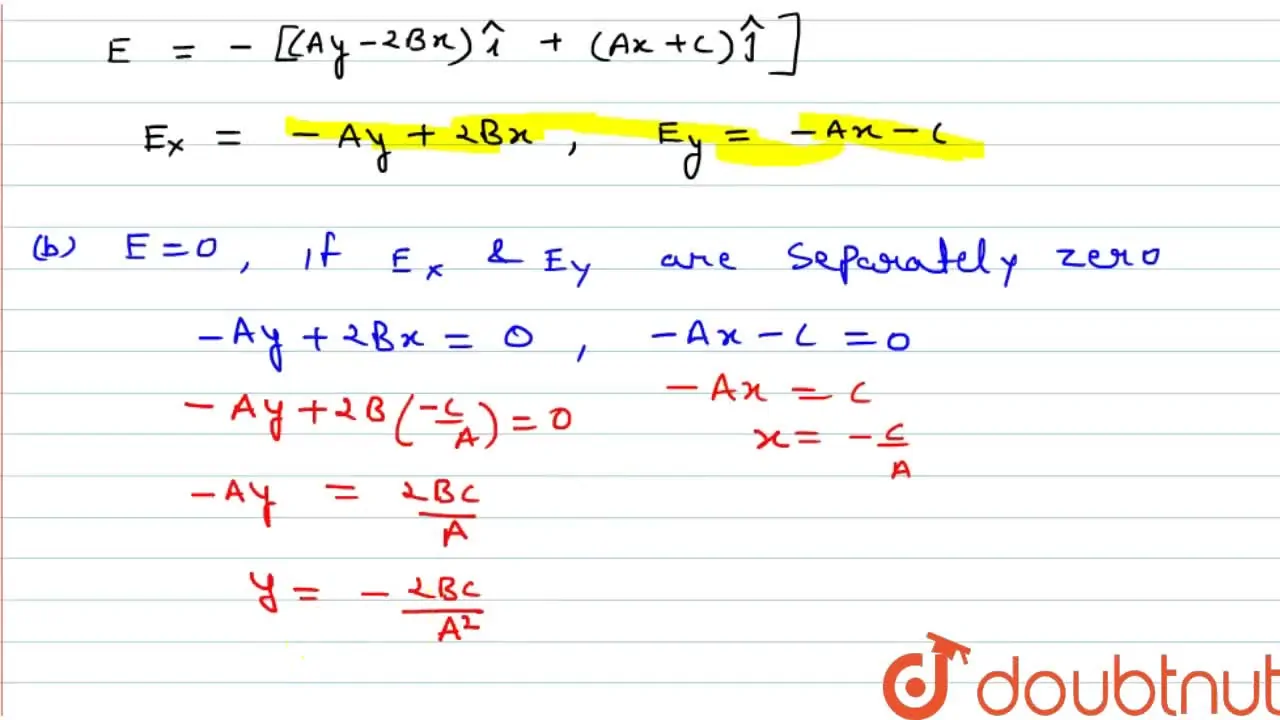In a certain region of space, the electric potential is V(x,y,z)=Axy−Bx2+Cy, where A, B and C are positive constants.
(a) Calculate the x, y and z- components of the electric field.
(b) At which points is the electric field equal to zero?
The correct Answer is:A, B, C
a. E=−(∂V∂xˆi+∂V∂yˆj+∂V∂zˆk)
=−[(Ay−2Bx)ˆi+(Ax+C)ˆj]
=∴Ex=(−Ay+2Bx)
and Ey=(−Ax−C)
(b)E=0 if Ex and Ey are separately zero.
∵−Ay+2Bx=0 ……..i
and −Ax−C=0……..ii
Solving these two equations
We get
x=−CA and y=−2BCA2
Related Playlists
- BOOK - DC PANDEY ENGLISHCHAPTER - ELECTROSTATICSEXERCISE - Level 1 Subjective15videos
ELECTROSTATICS
- BOOK - DC PANDEY ENGLISHCHAPTER - ELECTROSTATICSEXERCISE - SUBJECTIVE_TYPE6videos
ELECTROSTATICS
- BOOK - DC PANDEY ENGLISHCHAPTER - ELECTROSTATICSEXERCISE - Level 1 Assertion And Reason19videos
ELECTROSTATICS
- BOOK - DC PANDEY ENGLISHCHAPTER - ELECTROSTATIC POTENTIAL AND CAPACITORSEXERCISE - (C) Chapter exercises50videos
ELECTROSTATIC POTENTIAL AND CAPACITORS
- BOOK - DC PANDEY ENGLISHCHAPTER - GRAVITATIONEXERCISE - All Questions135videos
GRAVITATION
Similar Questions
The potential at any point is given by V=x(y2−4x2). Calculate the cartesian components of the electric field at the point.
View SolutionThe position of the point where the net electric field will be zero is
 View Solution
View SolutionIn a certain region of space, the electric field is zero. From this, we can conclude that the electric potential in this region is:
View SolutionIn a certain region of space the electric potential V is known to be constant. Is the electric field in this region (a) positive (b) zero ,or (c ) negative ?
View SolutionIn a certain region of space, the potential is given by V=k(2x2−y2+z2). The electric field at the point (1, 1, 1) has magnitude:
View SolutionThe electric potential existing in space is V(x,y,z)=A(xy+yz+zx).(a) Write the dimensional formula of A. (b) find the expression for the electric field.( c ) If A is 10 SI units, find the magnitude of the electric field at (1m, 1m, 1m).
View SolutionThe electric potential existing in space is V(x,y,z)=A(xy+yz+zx)
(a) Write the dimensional formula of A.
(b) Find the expression for the electric field.
(c) If A is 10 SI units, find the magnitude of the electric field at (1m,1m,1m)View SolutionA,B and C are three points in a unifrom electric field. The electric potential is
 View Solution
View SolutionIn a certain region of space, variation of potential with distance from origin as we move along x-axis is given by V=8x2+2, where x is the x-coordinate of a point in space. The magnitude of electric field at a point ( -4,0) is
View SolutionIn a certain region of space, variation of potential with distance from origin as we move along x-axis is given by V=8x2+2, where x is the x-coordinate of a point in space. The magnitude of electric field at a point ( -4,0) is
View Solution


